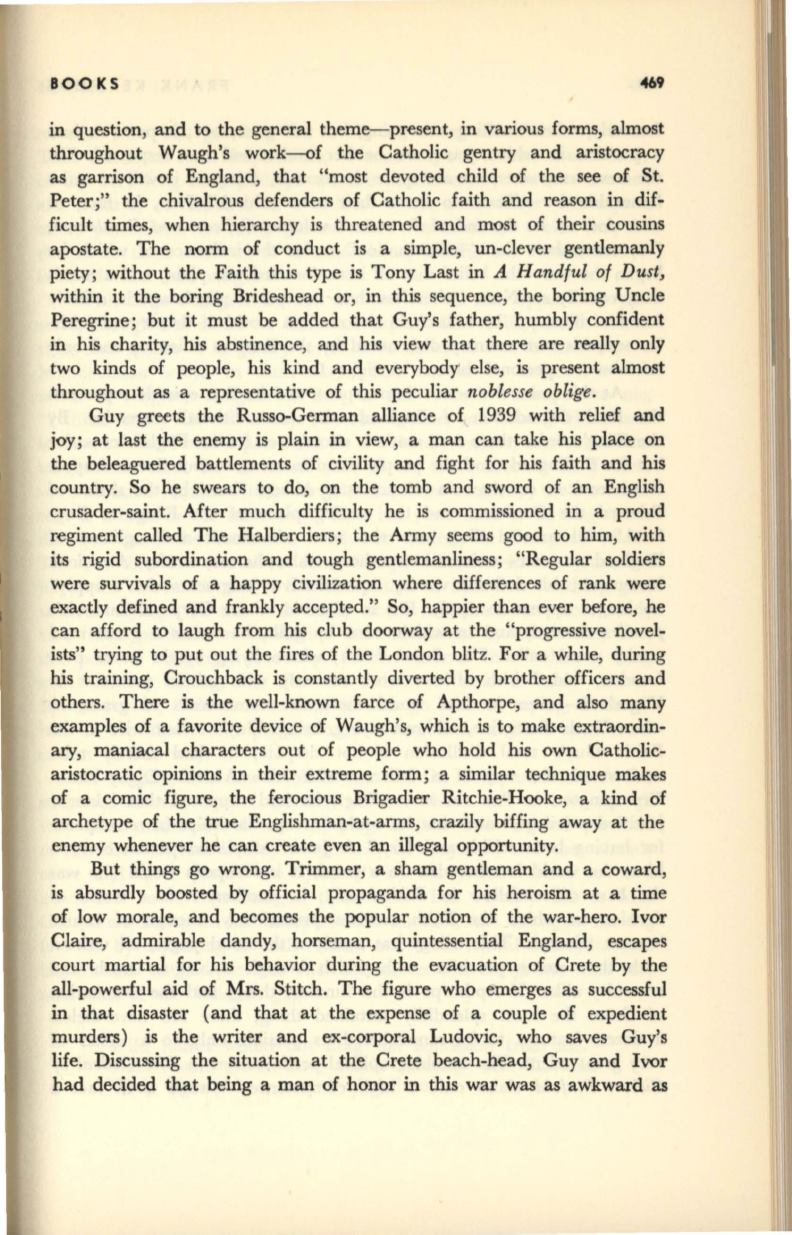
BOOKS
469
in question, and to the general theme--present, in various forms, almost
throughout Waugh's work--of the Catholic gentry and aristocracy
as garrison of England, that "most devoted child of the see of St.
Peter;" the chivalrous defenders of Catholic faith and reason in dif–
ficult times, when hierarchy is threatened and most of their cousins
apostate. The norm of conduct is a simple, un-clever gentlemanly
piety; without the Faith this type is Tony Last in
A Handful of Dust,
within
it the boring Brideshead or, in this sequence, the boring Uncle
Peregrine; but it must be added that Guy's father, humbly confident
in his charity, his abstinence, and his view that there are really only
two kinds of people, his kind and everybody' else, is present almost
throughout as a representative of this peculiar
noblesse oblige.
Guy greets the Russo-German alliance of 1939 with relief and
joy; at last the enemy is plain in view, a man can take his place on
the beleaguered battlements of civility and fight for his faith and his
country. So he swears to do, on the tomb and sword of an English
crusader-saint. After much difficulty he is commissioned in a proud
regiment called The Halberdiers; the Army seems good to him, with
its rigid subordination and tough gentlemanliness; "Regular soldiers
were survivals of a happy civilization where differences of rank were
exactly defined and frankly accepted." So, happier than ever before, he
can afford to laugh from his club doorway at the "progressive novel–
ists" trying to put out the fires of the London blitz. For a while, during
his training, Crouchback is constantly diverted by brother officers and
others. There is the well-known farce of Apthorpe, and also many
examples of a favorite device of Waugh's, which is to make extraordin–
ary, maniacal characters out of people who hold his own Catholic–
aristocratic opinions in their extreme form; a similar technique makes
of a comic figure, the ferocious Brigadier Ritchie-Hooke, a kind of
archetype of the true Englishman-at-arms, crazily biffing away at the
enemy whenever he can create even an illegal opportunity.
But things go wrong. Trimmer, a sham gentleman and a coward,
is absurdly boosted by official propaganda for his heroism at a time
of low morale, and becomes the popular notion of the war-hero. I vor
Claire, admirable dandy, horseman, quintessential England, escapes
court martial for his behavior during the evacuation of Crete by the
all-powerful aid of Mrs. Stitch. The figure who emerges as successful
in that disaster (and that at the expense of a couple of expedient
murders) is the writer and ex-corporal Ludovic, who saves Guy's
life. Discussing the situation at the Crete beach-head, Guy and Ivor
had decided that being a man of honor in this war was as awkward as


